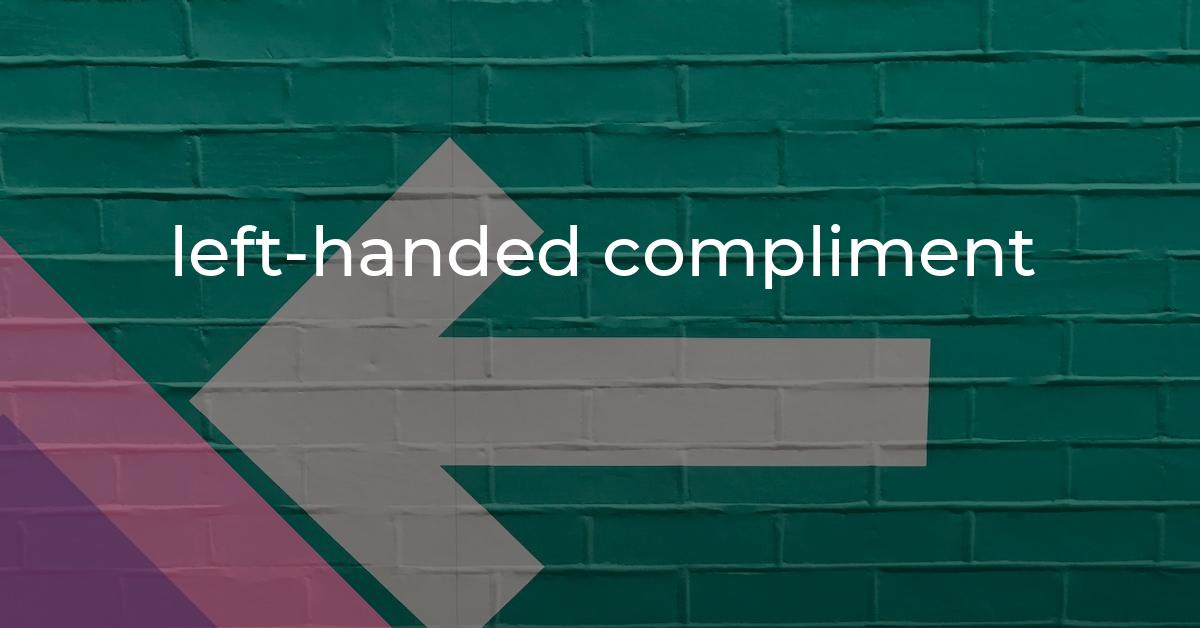left-handed compliment: Idiom Meaning and Origin
What does ‘left-handed compliment’ mean?
A left-handed compliment is a remark that seems like a compliment but actually contains a hidden insult or criticism, often making the receiver feel uneasy or offended.

Idiom Explorer
When someone delivers a low blow, they say something or do something that is unfair or hurtful, often causing embarrassment or emotional pain to the other person.
The idiom "leave something to be desired" means that something is not as good as it should be or as one would expect it to be.
The idiom "in the least" is used to emphasize that something is not at all or in any way. It is often used to express a strong negative sentiment or to emphasize a lack of expectation or possibility.
An "inside joke" is a humorous reference or remark that is understood only by a specific group of people who know the context behind it.
The idiom "hats off" is used to show admiration or respect for someone. It is often used when acknowledging someone's achievement or talent.
The idiom "half joke" refers to a statement or remark that is meant to be humorous, but also contains a serious or true element. It is a way of expressing a thought or opinion in a lighthearted manner while acknowledging some underlying truth or seriousness.
The idiom "go down the wrong way" means to do or say something that is inappropriate, offensive or causes discomfort to others.
The idiom "give the elbow" means to reject, ignore, or dismiss someone or something. It conveys the idea of pushing someone away or keeping them at a distance, either physically or emotionally.
Defiant Praise
A left-handed compliment is an idiom that describes a remark or comment that appears to be a compliment but contains an underlying insult or criticism. The idiom is derived from the belief that being left-handed was considered awkward or unusual compared to being right-handed, which was seen as the norm.
The use of the word 'left-handed' in this idiom carries a figurative meaning rather than a literal one. It reflects the historically negative associations and prejudices towards left-handedness. Left-handed individuals were often regarded as unlucky, evil, or using their left hand for sinister purposes. This negative bias is reflected in the idiom, implying that the compliment is tainted or insincere due to the hidden insult or criticism.
A backhanded compliment is a specific type of left-handed compliment that involves a compliment wrapped in a layer of sarcasm or criticism. It is a sneaky way of insulting someone while pretending to give them praise. For example, saying "You're really smart, for a left-handed person" is a backhanded compliment because it implies that left-handed people are not typically smart.
The term 'left-handed compliment' is thought to have originated in the late 16th century and has since become a common expression in the English language. Its usage has evolved over time, but the essence of the idiom remains the same. It serves as a reminder of the hidden complexities and potential for deception within human communication.
The structure of a left-handed compliment typically involves the speaker offering praise or admiration on the surface, but then introducing a subtle critique or derogatory comment. This allows the speaker to express their negative opinion indirectly, disguising it behind seemingly kind words. A left-handed compliment can be intentional, using the guise of a compliment to hurt or manipulate someone emotionally.
A Chinese compliment is another form of left-handed compliment that is related to cultural stereotypes and prejudices. It involves complimenting someone based on a stereotype or assumption about their Chinese heritage. For example, saying "You're really good at math, just like all Chinese people" is a Chinese compliment. It implies that all individuals of Chinese descent possess the same skill or characteristic, perpetuating stereotypes and undermining the individual's achievements.
Left-handed compliments can be found in various contexts, including everyday conversations, professional settings, and public discourse. They may be used as a means of undermining or belittling someone, expressing jealousy or sarcasm, or expressing disapproval while maintaining a facade of politeness. The nature of a left-handed compliment makes it a form of linguistic subversion, where the speaker aims to deceive or manipulate through the clever use of language.
One example of a left-handed compliment is the phrase "That's a brave outfit choice" when someone is wearing something unusual or daring. While the words "brave" and "choice" may initially seem like compliments, the underlying meaning is that the outfit is strange or unattractive.
Another related idiom is "low blow", which refers to a particularly harsh or mean-spirited insult. While not specifically a left-handed compliment, a low blow is similar in that it aims to hurt someone's feelings or dignity through words. It can be seen as a verbal attack that is intended to hit below the belt, disregarding social norms or boundaries of respect.
Yet another related idiom is "damn with faint praise", which involves giving someone a small or lukewarm compliment that is actually a disguised insult. This idiom suggests that the speaker is intentionally withholding full praise or recognition, implying that the person's accomplishments or qualities are not truly worthy of admiration.
Identifying a left-handed compliment can sometimes be challenging, as it requires decoding the hidden meaning or intention behind the words. This can lead to confusion or mixed reactions from the recipient, who may initially perceive it as a genuine compliment but later realize the underlying criticism or insult. The subtlety and ambiguity of left-handed compliments make them an intriguing aspect of language, reflecting the complexity and potential for deception within human communication.
A left-handed compliment is an idiom that describes a remark or comment that appears to be a compliment but contains an underlying insult or criticism. It stems from the historical negative associations with left-handedness and is a common phrase in the English language. Left-handed compliments offer an interesting insight into the complexities of human communication, highlighting the potential for deception and disguise concealed within polite conversation.
Example usage
Examples of how the idiom "left-handed compliment" can be used in a sentence are:
- She said that my new haircut was "interesting." It felt like a left-handed compliment.
- When my boss said my presentation was "better than I expected," I could tell it was a left-handed compliment.
- He described her as "smart for a woman," which was clearly a left-handed compliment.
More "Insults" idioms



